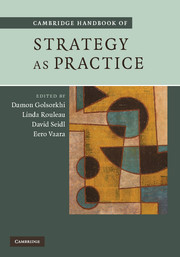Book contents
- Frontmatter
- Contents
- List of figures
- List of tables
- List of contributors
- Introduction: What is Strategy as Practice?
- PART I ONTOLOGICAL AND EPISTEMOLOGICAL QUESTIONS
- PART II THEORETICAL DIRECTIONS
- PART III METHODOLOGICAL TRACKS
- 13 Broader methods to support new insights into strategizing
- 14 Critical discourse analysis as methodology in Strategy as Practice research
- 15 Researching everyday practice: the ethnomethodological contribution
- 16 Researching strategists and their identity in practice: building ‘close-with’ relationships
- 17 Studying strategizing through narratives of practice
- PART IV APPLICATION VARIATIONS
- Author Index
- Index
- References
13 - Broader methods to support new insights into strategizing
Published online by Cambridge University Press: 05 October 2012
- Frontmatter
- Contents
- List of figures
- List of tables
- List of contributors
- Introduction: What is Strategy as Practice?
- PART I ONTOLOGICAL AND EPISTEMOLOGICAL QUESTIONS
- PART II THEORETICAL DIRECTIONS
- PART III METHODOLOGICAL TRACKS
- 13 Broader methods to support new insights into strategizing
- 14 Critical discourse analysis as methodology in Strategy as Practice research
- 15 Researching everyday practice: the ethnomethodological contribution
- 16 Researching strategists and their identity in practice: building ‘close-with’ relationships
- 17 Studying strategizing through narratives of practice
- PART IV APPLICATION VARIATIONS
- Author Index
- Index
- References
Summary
waxman: ‘In other words, you found that your view of the world, your ideology, was not right; it was not working.’
greenspan: ‘Absolutely, precisely […] you know, I was shocked because I have been going for 40 years or more with very considerable evidence that it was working exceptionally well.’
(Transcription from hearings by the Government Oversight Committee of the United States House of Representatives, 23 October 2008)‘…the situation is manifestly not coming under control. Things continue to fall apart.’
(Paul Krugman, 27 October 2008Introduction
Crises affecting different aspects of the global economy began to capture public attention as we prepared the final version of this chapter in the last months of 2008. Markets were on a downward roller coaster generating dramatic government responses around the world. While elected officials tended to speak and act as if they were close to calming volatile economic behaviour, other observers were less sanguine, including former chairman of the United States Federal Reserve Board Alan Greenspan and Professor Paul Krugman, who won the Nobel Prize in mid-October for his research on trade and the location of economic activity.
Gradually, the increasing instability of financial institutions, housing markets, employment and other indicators of economic activity became so significant that we decided we could not finish this chapter without a substantial change in perspective. Our initial draft applauded increasing attention to Strategy as Practice, or strategizing, recognized the importance of the case studies that provide almost all empirical evidence of the micro-behaviour that is the focus of this area of inquiry, but argued for a broader methodological base.
Information
- Type
- Chapter
- Information
- Cambridge Handbook of Strategy as Practice , pp. 201 - 216Publisher: Cambridge University PressPrint publication year: 2010
References
Accessibility standard: Unknown
- 7
- Cited by
